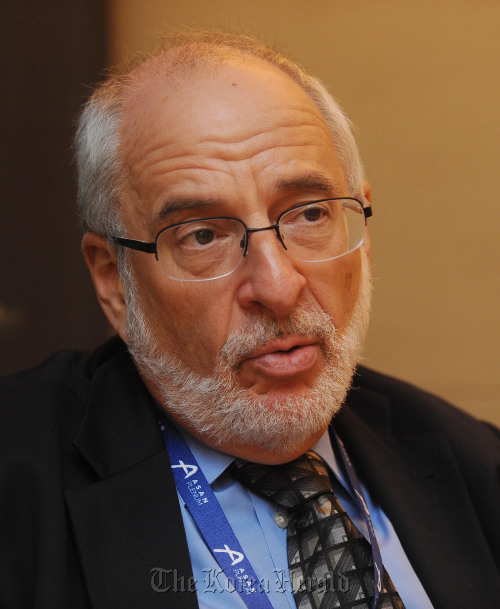North Korea may not proceed with nuke test in immediate future: Pollack
By Korea HeraldPublished : April 29, 2012 - 19:11
North Korea is unlikely to conduct a third nuclear test in the immediate future given that it could infuriate China and make the political tide unfavorable for it ahead of the December presidential vote in the South, a renowned U.S. scholar said.
“They will test it at some point, but not now yet,” Jonathan Pollack of the Brookings Institution, a Washington-based think tank, told The Korea Herald.
“The reason might not be technical, but political that another nuclear test would probably be damaging to North Korea from the point of view of seeing a future South Korean president more aligned with their interests.”
“They will test it at some point, but not now yet,” Jonathan Pollack of the Brookings Institution, a Washington-based think tank, told The Korea Herald.
“The reason might not be technical, but political that another nuclear test would probably be damaging to North Korea from the point of view of seeing a future South Korean president more aligned with their interests.”

Pollack was in Seoul last week to attend the 2012 Asan Plenum, a three-day international forum on global challenges that kicked off last Wednesday. The annual forum was organized by local think tank Asan Institute for Policy Studies.
Pyongyang may face a tougher response from its crucial patron China should it take another destabilizing action following the recent rocket launch, he pointed out. In an unusual move, Beijing agreed at the U.N. Security Council to condemn Pyongyang on April 16, three days after the botched launch.
“They may also be weighing the implications. This time, China would really impose some severe costs on them. We have the Chinese vice foreign minister in the forum, giving some very forceful remarks,” he said.
“He did not say a nuclear test, but you could see what he was talking about to make clear that China’s disapproval of any such third test would be very strong, potentially very harsh.”
Pollack paid particular attention to the fact that Pyongyang has not been explicit yet about its preparation for a nuclear test while it gave some explanation before their past nuclear tests in 2006 and 2009.
“There has been no explicit threat to test the nuclear weapon. The other thing I want to emphasize that in both 2006 and 2009, they developed almost what we would call an immediate campaign over a period of time,” he said.
“I don’t know, it was perhaps, weeks or months, but it was trying to build the case for why they would then proceed to a nuclear test.”
Although it would not be easy for Beijing to change its core policy toward its impoverished ally considering that it favors stability on the peninsula, China could make some adjustments in it to protect its national interests, he argued.
“The Chinese are not, in my own view, likely to discard North Korea, but under some circumstances, it is possible that they might really try to put limits on the relationship if North Korea is affecting their Chinese vital interests,” he said.
“China’s larger worries concern North Korea undertaking actions to which the ROK (Republic of Korea) would respond this time, and then, this triggers an environment that draws in both the U.S. and China on the peninsula.”
Regarding concerns here that the U.S. could show some reluctance to intervene militarily should a war break out here as it did in Syria, he said the situation would be different.
Given deepening public fatigue in the U.S. after a decade of war in Iraq and Afghanistan, and its recent show of reluctance to engage in a Syrian conflict, some here showed apprehension over how the U.S. would move in case of a war here.
“It would be much more that the U.S. has made explicit, time and time again, has invested enormous amount of treasure, financial treasure, human commitments of the ROK. That is not something we would walk away from,” he said.
“It does have a symbolic meaning (to other U.S. allies) as well without a doubt.”
By Song Sang-ho (sshluck@heraldcorp.com)
-
Articles by Korea Herald


![[Exclusive] Korean military set to ban iPhones over 'security' concerns](http://res.heraldm.com/phpwas/restmb_idxmake.php?idx=644&simg=/content/image/2024/04/23/20240423050599_0.jpg&u=20240423183955)

![[Graphic News] 77% of young Koreans still financially dependent](http://res.heraldm.com/phpwas/restmb_idxmake.php?idx=644&simg=/content/image/2024/04/22/20240422050762_0.gif&u=)



![[Pressure points] Leggings in public: Fashion statement or social faux pas?](http://res.heraldm.com/phpwas/restmb_idxmake.php?idx=644&simg=/content/image/2024/04/23/20240423050669_0.jpg&u=)










